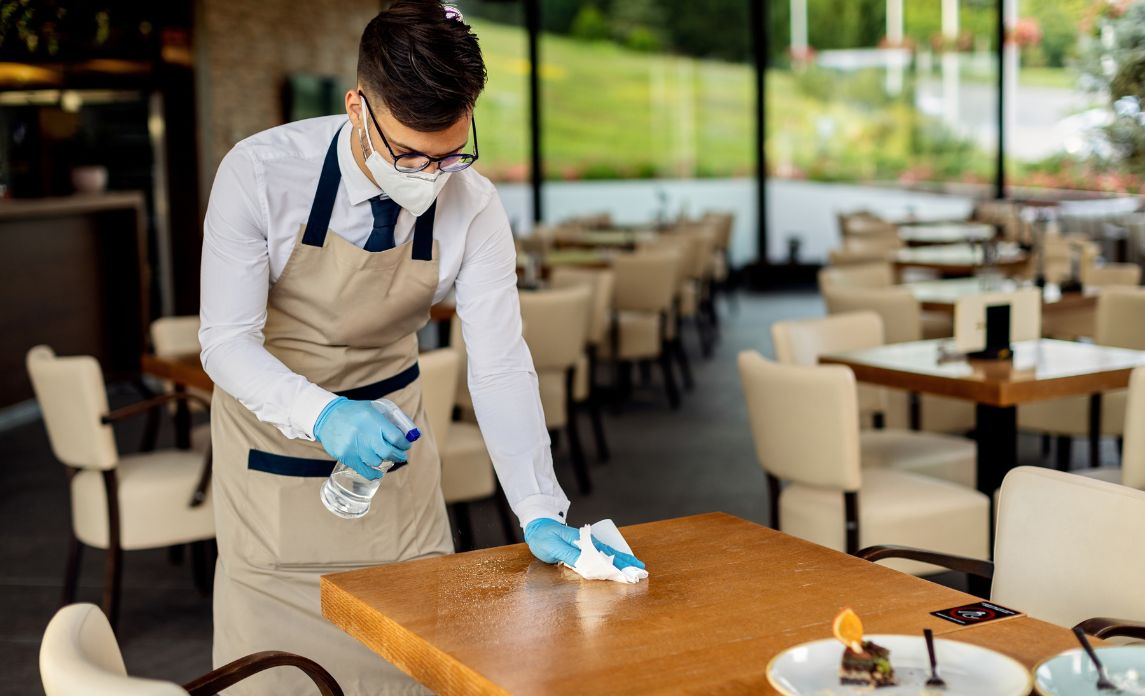Keeping kitchen countertops clean is paramount for hygiene, health, and safety. This is particularly true for business establishments that serve food, like restaurants and cafes. Fortunately, there are professional cleaning companies like Crewcare that provide reliable restaurant cleaning services.
That being said, there are various types of materials used for countertops. Some examples include marble, tile, and wood, and it’s important to be aware of various cleaning methods for each. This way, you can both ensure the longevity of your countertops and preserve the aesthetics of your kitchen.
Below is a list of the most common kinds of countertops materials and a few tips on how to keep them clean:
Marble, Granite, and Quartz
Among the most popular countertops used around the world is stone, whether real or engineered. They can be more expensive compared to other options, but they’re also extra durable and can also increase the value of your establishment should you decide to sell it later on.
For marble, the key to keeping it in good shape is to avoid acidic cleaners. This is because marble is made of calcium carbonate, which is alkaline in nature. Also, keep in mind that marble is porous and therefore stains and scratches easily. Use gentle cleaners and soft cloths to keep your marble countertops pristine. Also, remember to wipe up spills as soon as possible to prevent stains from seeping into the material.
For quartz, it’s also best to steer aways from acidic cleaners—even lemon juice should be avoided completely. That being said, quartz is heat resistant up to a certain degree. If you need to use hot water for cleaning, make sure it doesn’t exceed 150 degrees. You should also avoid prolonged exposure to heat (e.g., placing hot pots or pans directly onto the surface); doing this will break down the components of the quartz and ruin its color.
Finally, for granite countertops, a combination of dish soap and warm water will be more than enough to take care of most spills. For more stubborn stains or if you want to disinfect the surface, use alcohol instead of bleach to prevent dulling. Apply the alcohol using a soft cloth to avoid scratches.
Tile
If you have tile countertops, the same method of cleaning your bathroom tiles will apply. That is, you can freely use your detergent of choice as well as a suitable bleach. Let the solution sit for the recommended amount of time before scrubbing and washing it away. If there are stubborn stains on the grout, you can let the cleaning product sit a little longer to loosen the dirt and grime.
You should also reseal the grout on your tile countertops every two years or so. This will prevent stains, as well as stop the growth of bacteria and mildew.
Wood or Butcher Block
Countertops made from hardwood or butcher block look extremely fancy, but they can be difficult to maintain. To preserve a wooden countertop, use a nonabrasive cleaning solution. You can also make your own by mixing some warm water with distilled white vinegar. Once done, wipe the surface dry with a soft cloth.
It’s also crucial to seal hardwood or butcher block countertops to prevent premature damage, warping, and cracking. You can have it professionally sealed, although you can also DIY it with food-grade oil or wax. In case the wood gets scratched or nicked, you can sand the surface and then reapply your preferred sealant. Buff the surface to ensure an even shine.
Laminate or Formica
The good thing about laminate countertops is that they’re compatible with a variety of multipurpose cleaners. That being said, you have to be careful not to use too much water. If you flood laminate or formica countertops, water may seep into the seams and cause the substrate to swell. For the best results, wipe your laminate countertops dry as soon as you finish rinsing it.
If you need to disinfect your laminate countertops, use a suitable antibacterial spray. Avoid acidic or abrasive cleaners or bleaches, so as not to ruin the surface. Also, don’t use hot water for cleaning laminate or formica.
Stainless Steel
One of the best materials for countertops, especially for frequently used kitchens, is stainless steel. All you need to do is wash it with soap and water, rinse thoroughly, and dry. To keep the surface looking sleek, use a sponge for lathering up cleaner and a soft towel for drying to prevent scratches.
If you need to remove stains, you can try using hot water mixed with detergent. For more stubborn grime, use a paste made with equal parts dish soap and baking soda. Use a soft cloth to apply the mixture, following the direction of the steel’s grain.
Concrete
Last but certainly not least, sealed concrete countertops are extra tough and stain resistant. You can keep it clean with hot water, dish detergent, and a sponge. After rinsing, you can dry the concrete with a soft cloth.
For disinfection, rubbing alcohol is generally preferred over bleach. Spray a mixture of 1/4 cup alcohol and 2 cups water onto the sealed concrete, let it sit for about 10 minutes, then wipe dry with a soft cloth.
Keeping your countertops clean serves two primary goals: safety and appearance. With the above-mentioned tips, maintaining the good shape of your home’s or business’s countertops will be much easier.


